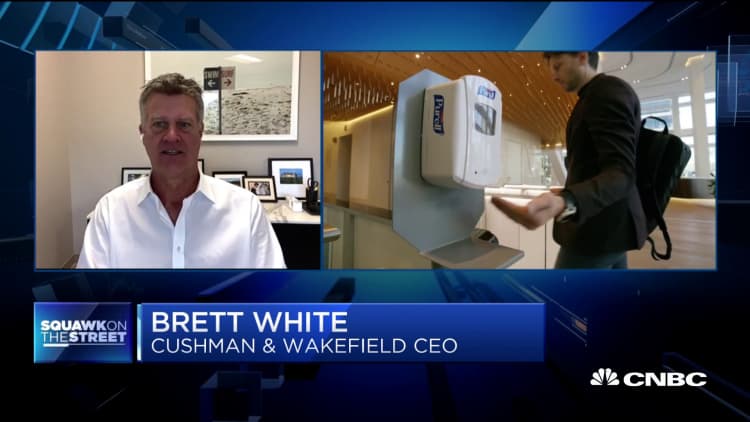
Cushman & Wakefield CEO Brett White told CNBC on Friday that he believes the size of the remote workforce may double as a result of the coronavirus pandemic. But, he added, the vast majority will ultimately return to the office.
"If right now roughly 4.5%, 5% of the workforce is permanently at home ... pre-Covid, we think that will double," White said on "Squawk on the Street." "We think as much as 10%, 11% of the workforce could be at home permanently."
But White, who also is chairman of the global commercial real estate firm, stressed those projections are far from the current landscape, where sizable shares of the workforce have been remote since mid-March. He said, "10% is a lot less than 90%, and 90% are going to be in offices in one form or another."
White's comments came after Cushman & Wakefield reported an 18% year-over-year decline in quarterly revenues Thursday as the coronavirus pandemic disrupted real estate brokerage activity. Net income came in at a loss of $100.8 million, compared with profits of $6.3 million in the year-ago quarter.
The stock, which is down about 47% year to date, traded higher by about 2.75% on Friday to $10.83 each.
There remains significant uncertainty about the long-term economic changes ushered in by the coronavirus pandemic. The future of work, in particular, has been called into question because many companies proved to quickly yet successfully pivot to remote operations in an attempt to reduce transmission of the virus.
Twitter and Square, both of which have Jack Dorsey as chief executive, have told most employees they can work from home "forever" if they want. Other tech firms such as Google parent Alphabet and Facebook have already extended their work-from-home timelines through June 2020.
And while Facebook CEO Mark Zuckerberg has previously said he could see about 50% of its employees being remote in the next five to 10 years, the social media giant earlier this week inked a massive lease for office space in Manhattan, an indication the remote-work question may not have a binary answer.
White, a commercial real estate veteran who led CBRE from 2005 to 2012, said he believes it will take around two to three years for the U.S. office market to recover, with additional near-term pain ahead. The firm projects U.S. office vacancies could rise to as high as 15% to 18% in the next 24 to 30 months, he said, implying a rent decline of between 5% and 15%.
Companies across the U.S. have begun to welcome workers back to the office, but White said the return has been slower than some expected. "You look around the country, ... most office businesses are open in one form or another," he said. "Most of them have said, 'We'll take back 20%, 30% of our employees, and yet you walk into the office and there's half a dozen people in there."
Employees are "voting with their feet," White said. "They don't feel safe, and they also don't feel it's worth the hassle because they're not required to go to work."
However, White emphasized that those feelings are likely to change as the coronavirus situation improves. The company has surveyed more than 100 companies around the world, he said, and 90% of people indicated they want to get back to the office.
One of the most pressing short-term questions that determines when people head back to the office is the availability of child care, White said. "Until we have our schools open again, this is a major constraint to back to work."
"One thing that's very interesting to me right now is we are seeing a direct correlation between revenue production in businesses and those geographies that are open with people in the offices and those that aren't," he added. "In the early days, we talked about the high productivity at home. That's changing, and so I think everyone is going to feel this need to solve these issues."



